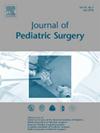Role of Emerging Urinary Biomarkers in Predicting Progressive Deterioration of Kidney Function in Congenital Anomalies of Kidney and Urinary Tract: Trefoil Family Factor 3, Alpha Soluble Klotho and Urinary Microalbuminuria
IF 2.4
2区 医学
Q1 PEDIATRICS
引用次数: 0
Abstract
Introduction
Chronic kidney disease is an irreversible fate of many CAKUT (Congenital Abnormalities of the Kidneys and Urinary Tract) patients. Biomarkers involved in the disease progression are raised early in the disease process and aid in identifying the individuals at risk of progressive renal function decline.
Aims
To determine and compare the initial levels of urinary biomarkers in patients of CAKUT with asymptomatic controls and to correlate the same with progression of renal disease.
Results
This study includes 66 children with CAKUT and 22 healthy controls. Initial levels of three urinary Biomarkers: Trefoil family factor 3 (TFF3), Alpha soluble Klotho and Albumin-to-creatinine ratio (ACR) was recorded. Kidney function was assessed initially and at the end of 1 y follow up. Progressive deterioration of renal disease was noted in 26 (fall in GFR by >10 ml/min/m2). Median levels of urinary TFF3, alpha soluble Klotho and ACR was higher in patients with CAKUT (263, 18, 56 mcg/gCr) as compared to controls (15, 5, 6 mcg/gCr) and was further higher in patients having a progressive kidney disease (586, 40, 182 mcg/gCr). The cut-off value of the TEF3 to diagnose progressive renal disease was 178 mcg/g Cr with sensitivity and specificity of 95 % and 96 %, respectively. Using a cut-off of 29 mg/g Cr for ACR, sensitivity and specificity were 97 and 96 %, respectively.
Urinary soluble Klotho was a relatively poor urinary biomarker with sensitivity and specificity of only 70 and 78 %, respectively, at a cut-off value of 18 mcg/g Cr.
Conclusion
TFF3 and ACR are useful biomarkers which can be included in the biomarker panel to identify patients having a progressive renal disease and are at a risk of developing CKD.
新出现的尿液生物标志物在预测先天性肾脏和泌尿道畸形患者肾功能进行性恶化中的作用:Trefoil 家族因子 3、α-可溶性 Klotho 和尿微量白蛋白尿。
简介慢性肾病是许多 CAKUT(先天性肾脏和尿路异常)患者不可逆转的命运。参与疾病进展的生物标志物会在疾病早期升高,有助于识别肾功能逐渐衰退的高危人群。研究目的:确定并比较 CAKUT 患者与无症状对照组尿液生物标志物的初始水平,并将其与肾病进展相关联:本研究包括66名CAKUT患儿和22名健康对照者。三种尿液生物标志物的初始水平:记录了三叶草家族因子 3 (TFF3)、α-可溶性 Klotho 和白蛋白-肌酐比值 (ACR) 的初始水平。最初和随访 1 年后对肾功能进行了评估。26例患者的肾病逐渐恶化(GFR下降>10 ml/min/m2)。与对照组(15、5、6 mcg/gCr)相比,CAKUT 患者尿液中 TFF3、α-可溶性 Klotho 和 ACR 的中位水平较高(263、18、56 mcg/gCr),肾病进展期患者的尿液中 TFF3、α-可溶性 Klotho 和 ACR 的中位水平更高(586、40、182 mcg/gCr)。诊断进行性肾病的 TEF3 临界值为 178 微克/克铬,敏感性和特异性分别为 95% 和 96%。以 29 毫克/克 Cr 为 ACR 临界值,敏感性和特异性分别为 97% 和 96%。尿液可溶性 Klotho 是一种相对较差的尿液生物标志物,在截断值为 18 微克/克铬时,其灵敏度和特异性分别仅为 70% 和 78%:结论:TFF3 和 ACR 是有用的生物标志物,可将其纳入生物标志物面板,以识别患有进展性肾病和有发展为慢性肾脏病风险的患者。
本文章由计算机程序翻译,如有差异,请以英文原文为准。
求助全文
约1分钟内获得全文
求助全文
来源期刊
CiteScore
1.10
自引率
12.50%
发文量
569
审稿时长
38 days
期刊介绍:
The journal presents original contributions as well as a complete international abstracts section and other special departments to provide the most current source of information and references in pediatric surgery. The journal is based on the need to improve the surgical care of infants and children, not only through advances in physiology, pathology and surgical techniques, but also by attention to the unique emotional and physical needs of the young patient.

 求助内容:
求助内容: 应助结果提醒方式:
应助结果提醒方式:


